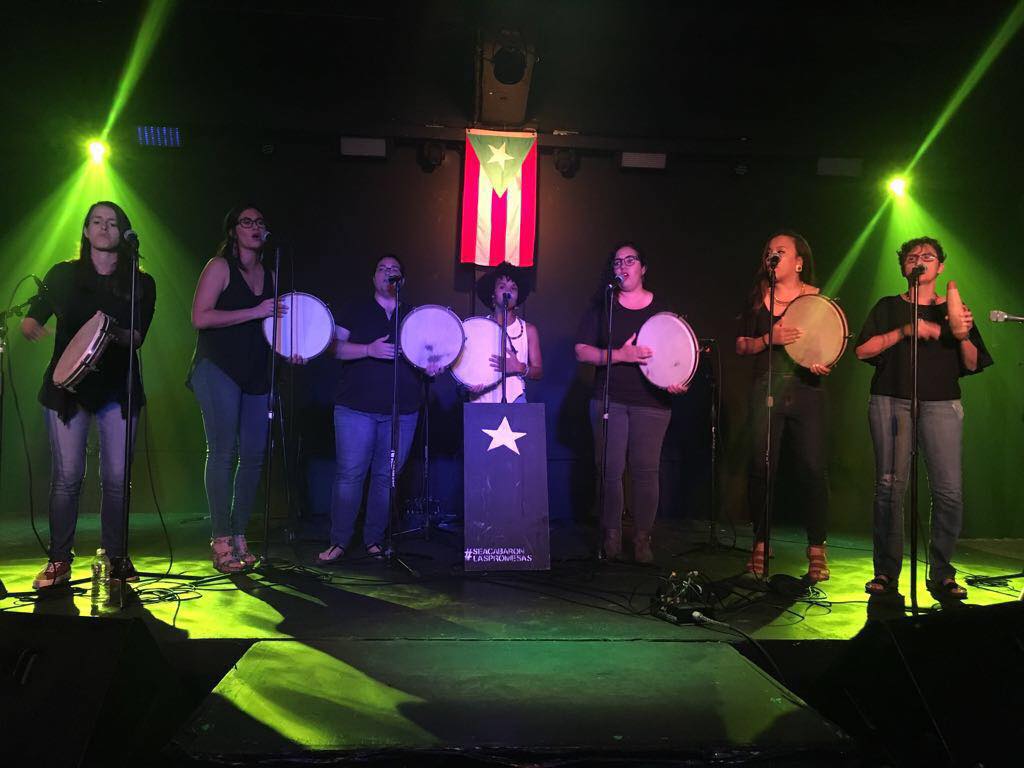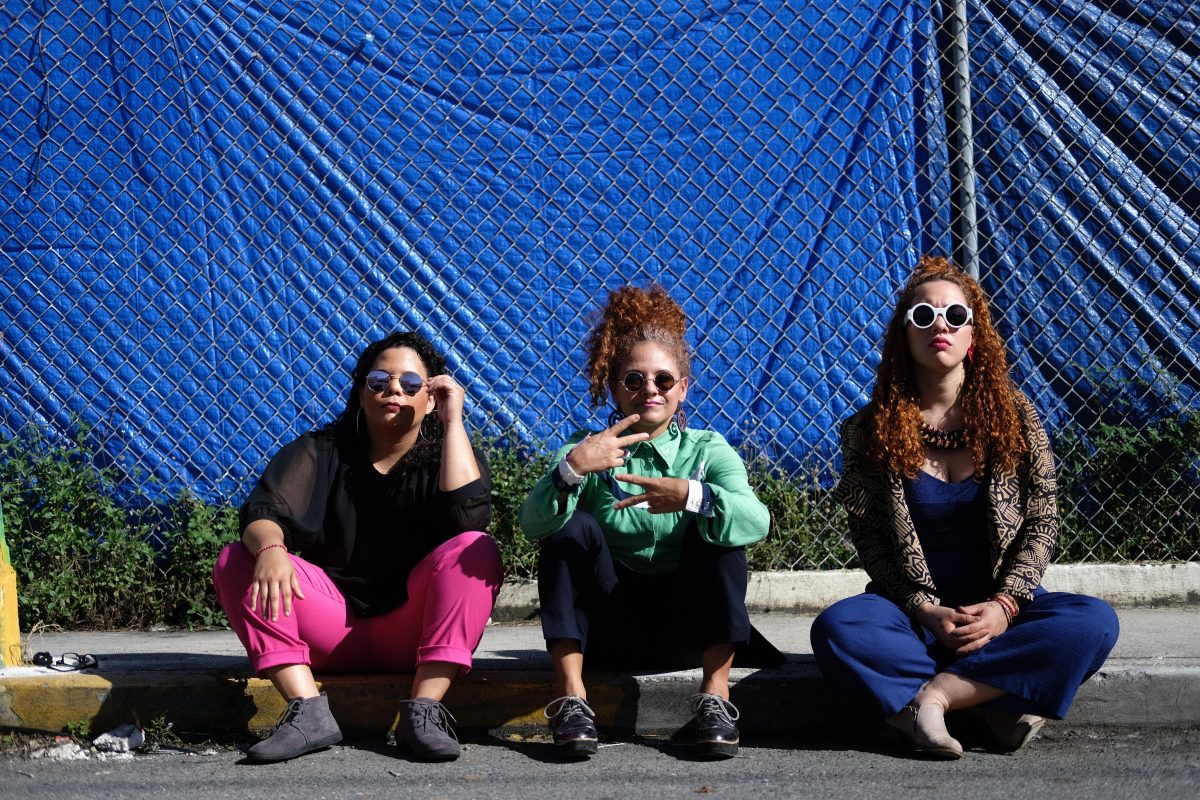“Que cosa brava, que cosa bella, estar rodeada de mujeres pleneras,” sing the women of Plena Combativa, one of the few all-woman groups performing the Puerto Rican folk musical tradition on the island, outside a tiny wooden house in the rural northeastern town of Ceiba.
They’re playing the pandereta plenera and güiro under the searing Caribbean sun while standing on the porch of the late Isabel Rosado, a leader of Puerto Rico’s independence movement. A small crowd has gathered to remember the life of a woman who was imprisoned for her commitment to the liberation of their shared tierra.
It’s not uncommon to find Plena Combativa singing at progressive events across the archipelago. The women, today wearing T-shirts about destroying the patriarchy and emphasizing that abortion is a personal decision, are often asked to perform their original compositions at protests and cultural gatherings. Like this show, they’re usually the only all-woman group performing the traditional and male-dominated style.

Plena, a musical genre rooted in African song and dance, originated in the southern coastal city of Ponce around 1920, though its complicated rhythms and “soneos,” or oral calls and responses, stretch back decades earlier. The rhythm is a fast-paced beat played on panderetas, which are multiple hand-held drums similar to a tambourine but without the cymbals. Plenas were often heard in sugar-growing areas, where enslaved and poor men sung about the social concerns of Puerto Rican society. It was music for the marginalized – but since its inception, the genre largely relegated women to vocals and dance, a component that’s less important to the genre as it is for its Afro-Boricua musical sister bomba.
While plena is a communal and participation-oriented musical culture, where crowds surrounding street musicians or audiences at shows are invited to sing, dance, and strike their own panderetas, women have still felt sidelined.
“I would try to enter spaces occupied by men and there were always moments where I felt uncomfortable,” Laura Freytes, one of the seven members of Plena Combativa tells me in Spanish before a rehearsal at San Juan’s El Hangar en Santurce. “There are situations of ego. I wouldn’t feel comfortable or secure. They made me feel like I wasn’t learning quickly enough, even though I was starting from zero.”
Freytes says the male arrogance in these spaces could dissuade women from learning and performing the rhythms, but even experienced pleneras are made to feel inferior. Miosoti Alvarado, one of the three women who directs the neo-plena and bomba-groove band Piquete has been playing bomba and plena for 10 years. When she first started, Alvarado would try to enter street plena circle jams, but remembers rarely ever being given space by male gatekeepers. At the time, bomba y plena were still considered a part of an older relic of the island’s folklore and cultural heritage, not necessarily a contemporary movement embraced by the new generation. Fans of both genres were forced to attend small, late-night events in neighborhoods throughout Loíza to enjoy live music. This wasn’t an option for most women, Alvardo says, as the risk of gender-based violence and maternal responsibilities kept them home after hours. The genres have since experienced a resurgence in popular Puerto Rican youth culture, and these days, with both folk genres booming on many San Juan blocks at any time of the day and Alvarado leading one of the rising bomba y plena groups in the capital, she has gained more respect. But she says sexism remains inevitable.
“When they see us playing, it’s like a shock. They are not ready to see women playing drums.”
“When they see us playing, it’s like a shock. They are not ready to see women playing drums,” Alvarado tells me over the phone. “Sometimes, if we are jamming, they want my instruments to play. If there are men playing and only one girl playing, they go to the girl and say, ‘ma’ prestamelo’ or ‘dile a la nena que me presta la pandereta.’”
This is why women-centered folkloric musical spaces are essential. With all-female or female-led groups, pleneras can learn, create, and practice without the paternalism of old-school male musicians. And since plena has been nicknamed the “periódico cantado” because its chants often document the everyday experiences of the pueblo, the musical form allows women to insert their own narratives and struggles into songs.

Plena Combativa was born out of the genre’s legacy of criticism and social change. The band’s members met in 2017, during plena workshops held by La Colectiva Feminista en Construcción, an intersectional feminist organization on the island. At demonstrations held by the group, the women would sing their rallying calls over plena rhythms. But the band didn’t form officially or start writing its own original music until after Hurricane María. Plena Combativa’s director, Adriana Santoni, posted a video of herself singing an original song about the coal ash deposits in Peñuelas and the police brutality protestors there faced. The video garnered 30,000 views overnight and the attention of Greenpeace, who wanted Santoni to perform the song at an event they were hosting to protest the Jones Act on the island. Without a group, she called on the women from the workshop. Together, they had their first stage performance and decided to officially form a band.
“It’s very important to bring women together to tackle all the things that we face on a daily basis.”
Since then, women have been some of the most in-demand performers for progressive events and parties in Puerto Rico. While bomba y plena returned to the popular zeitgeist in San Juan’s music scene about five years ago, before the Category 4 storm devastated the island, Plena Combativa is a part of a wave of women who are leading resistance efforts by returning to ancestral practices. For them, it’s through folk song and dance, but for other activists, like Tara Rodríguez Besosa, it’s about rallying to support local agriculture. For additional groups, like the women of La Colectiva Feminista en Construcción, it’s about uplifting the teachings and work of late women revolutionaries like Isabelita, Lolita Lebrón, and Blanca Canales.
“It’s very important to bring women together to tackle all the things that we face on a daily basis,” said Santoni, who, at 22, is the youngest member of the intergenerational band. “This group is part of a bigger movement.”
While rooted in traditional practices, the content of Plena Combativa’s music tackles contemporary problems concerning the island and its women. The group often writes songs that are critical of Puerto Rico’s colonial status, political corruption, and economic crisis. In one of their most popular songs, “Libre y Peligrosa,” they underline the danger that free, autonomous women pose to the imperialist white supremacist heteropatriarchy.
“Yo le canto a los macharranes que creen que mandan en mi/estás equivocado porque sobre mi cuerpo soy yo que vas a decidir/Libre y peligrosa/Libre y peligrosa soy yo/Libre y peligrosa pa’ que no me quieres aquí,” they sing.
The coro has become the sound of the island’s current struggles against gender-based violence and advocacy for reproductive rights; in 2018, 41 women were killed in Puerto Rico, more than half at the hands of their partner, and last month, the local government slashed abortion rights for teen girls.
“This is needed because it didn’t exist.”
“This is needed because it didn’t exist,” Plena Combativa’s Margarita Morales said of the group’s significance. “Yes, there are important women in plena, and we are actually looking into the histories of these women because it’s not visible or accessible, but it’s important because there wasn’t something like this. It was imperative to do this. We had to take advantage of the moment.”
For Piquete, three women leading a bomba and plena group in 2019 is itself revolutionary. The band, which blends Puerto Rico’s folk sounds with hip-hop, reggaeton, and dancehall, wants to make the genres mainstream. They write and perform original songs, including some about feminism and queer love, that they hope will make it on local radio, where they could reach a wider, general audience.
“As a colony, the U.S. has taught us that the things that come from outside of the island are better. That’s not true, and it’s time to change that,” Alvarado said. “I think just by doing that, by doing bomba y plena, there is a political message. I don’t have to say it because I’m doing it with my rhythm.”







